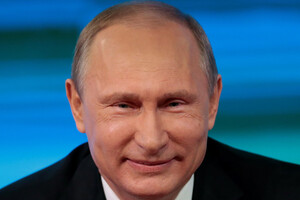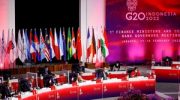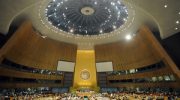The end of the Russian autocrat was falsely predicted for two decades.

Many observers of Russia and experts in international relations focused on the political death of Russian PresidentVladimir Putin. It's an understandable desire, but so far it's based more on optimism about karmic justice than reality. Villanova University political science professor Mark Lawrence Schrad writes about itfor Foreign Policy.
Practically every failure of the Kremlin is called “the beginning of the end of Putin” and his regime. The recent chaotic retreat and “regrouping” of the Russian armed forces under the pressure of the Ukrainian counteroffensive has caused another wave of premature speculation about Putin's imminent demise.
The story about the “end of Putin” is not something new and every time it consists of ultimately wrong predictions of various respectable journalists, scientists, Russian opposition politicians and even Western leaders. Predictions of Putin's imminent death were made throughout his reign.
Read also: Time to prepare for the collapse of Russia – General Hodges
After Putin replaced Boris Yeltsin in 2000 as president, his popularity was bolstered by the Russian economy's remarkable growth — an average of 7% per year for nearly a decade. The President was even forgiven for the “Nord-Ost” tragedies in 2002 and Beslan in 2004.
Everything changed in 2008, when Putin's invasion of Georgia, the global financial crisis and the collapse of global oil prices wiped out $1 trillion in Russian reserves and led to an 8% decline in GDP.
The media has been abuzz with political obituaries about the “end of the Putin era,” saying that now that the strong Russian economy on which Putin's legitimacy was based is dead and buried, his political career will surely be next. However, the Kremlin has weathered the storm thanks to smart economic policies.
Still reeling from the Great Recession of 2011-12, the formal re-election of Putin and his United Russia party was overshadowed by anti-corruption protests in Moscow and across Russia . Experts, opposition politicians and foreign leaders once again united in calling it “the beginning of the end for Putin.” However, he once again skilfully used a combination of a whip and a gingerbread man, so that after selective repression the tension subsided, and Putin stood his ground.
Rhetoric intensified again in response to the Euromaidan events in Ukraine in 2013-14. It was believed that the annexation of Crimea and the proxy war in Donbas would surely be “the end of Vladimir Putin.” . And Western economic sanctions, which will affect Russia's already unstable economy, will ultimately be his undoing.
But Putin's nationalist turn in favor of self-identification behind economic indicators seems to have strengthened his authority even more.
When this storm subsided, the growing popularity of the anti-corruption fighter Oleksiy Navalny gave reason to once again predict the end of Putin in 2017. In 2018, the pension reform will become «the beginning of the end of the Putin regime».
In 2019, the election of the President of Ukraine Volodymyr Zelenskyi “may be the downfall of Vladimir Putin”.
In 2020, both the dissatisfied youth of Russia and the wrong policy of the Kremlin regarding the COVID-19 pandemic were ready to “overthrow Vladimir Putin”.
Putin's unleashing of a full-scale war of aggression in Ukraine in February of this year has sparked an unprecedented wave of predictions about his end.
Or perhaps war crimes and atrocities in Buch strong> “done with Putin”?
Add to this a whole wave of reports that Putin is “sick” or “dying” – not based on actual intelligence, but based on long-distance diagnosis using photography.
It was the highest form of karmic hope: the desire that the universe itself would punish the Russian leader for his sins. front, we see more and more analytics about the end of Putin.
One of them is a recent article by the famous journalist and historian Ann Applebaum in the Atlantic: “It is time to prepare for a Ukrainian victory.”< /p>
Although the article begins with a restrained examination of the scale of Ukrainian successes and the striking lack of struggle among the retreating Russians, the author also resorts to the “end of Putin” genre, suggesting that Russia's lackluster actions on the battlefield will somehow contribute to Putin's ouster.
Also read: The world Putin wants: How obsession with distorted history drove the dictator to war – Foreign Affairs
The problem with this analytics, like all similar ones, is the lack of causal mechanisms. Of course, a Ukrainian victory is possible. But it alone will not spell the end of Putin. After all, many dictators, from Saddam Hussein after the Iran-Iraq conflict and the first Gulf War to Vladimir Lenin after Russia's failed invasion of newly independent Poland, have survived losing wars , which they launched.
Applebaum argues that Putin laid everything on the altar of his so-called “special military operation” as the basis of his legitimacy.
“And when the Russian elites finally realize that Putin's imperial project was not only a failure for Putin personally, but also a moral, political and economic disaster for the entire country, including them, then his claims to continue to be the legitimate ruler of Russia will melt away . … We should expect that a Ukrainian victory, of course, a victory in the Ukrainian sense of the term, will lead to the end of Putin's regime,”– writes the author and adds that her assumption is not a prediction, but rather a warning.
Is this finally what will really, finally condemn Putin to death? Only time will tell. But those 20 years, when Putin repeatedly experienced his prophesied death, should make us think.
He has survived an economic depression, international isolation, mismanagement during a deadly pandemic, a botched response to terrorists, and an intelligence fiasco that dragged Russia into a botched war—and he is still here.
The basis for most arguments about the end of Putin is the famously nebulous concept of “legitimacy.” As Applebaum writes: “It is inconceivable that [Putin] could continue to rule if the core of his claim to legitimacy—his promise to restore the Soviet Union—turns out to be not only impossible, but ridiculous.”
In the first decade of Putinism, it was Russia's stellar economic performance that gave Putin legitimacy among the people. But when growth gave way to stagnation due to the global economic crisis and further Western sanctions, we were repeatedly told that his position would become weak due to a lack of legitimacy.
So Putin turned to nationalism and legitimacy through identity, while maintaining the support of the population. , as the defender of the Russian nation: an image that persists despite an increasingly disastrous political and economic history.
Conceptually, the legitimacy of government is based on the fundamental premise of Western democracy that sovereignty ultimately belongs to the people, expressed through elections. A democratic leader without popular support has questionable legitimacy and is likely to face dismal future political prospects. However, both in theory and in practice, the application of the term “legitimacy” as understood in democracies to non-democratic contexts such as Putin's Russia appears to be flawed.
While “popular” legitimacy may indeed be the basis autocratic regime, autocrats have other mechanisms of control that democratic leaders do not: they can suppress opposition, stamp out dissent, and monopolize the media to maintain power.
However, a common flaw in all predictions of the end of Putin is that the focus on popular legitimacy marginalizes the issues of repression, struggle against dissent, and control over the mass media, on which modern autocracies are increasingly built.
So even beyond the question of whether Putin is considered “legitimate” by his own people (and whether his sky-high approval ratings indicate such legitimacy), there is no mechanism by which the loss of such legitimacy would spell the end of his power.
Indeed, both Russian and world history are replete with autocrats of dubious legitimacy who were tolerated for decades as they resorted to the aforementioned repression, eradication of rival elites, and propaganda and information control to consolidate their rule.< /p>
The first Soviet dictator, Lenin,had a keen eye for regime weakness — not least because he himself was a former revolutionary. Both in Tsarist Russia and throughout Europe, he saw enough windows for political change opening and then closing again to recognize that“revolution is impossible without a revolutionary situation… [but] not every revolutionary situation leads to revolution ».
For Lenin (unlike Karl Marx), revolutions did not happen spontaneously, they had to be “made”. For communist revolutions, as for any political changes in general, human participation is necessary.
The genre “the end of Putin”, as we can see, poorly explains how exactly political changes take place and what role the people play in them. .
Experts assume that economic sanctions will definitely weaken the regime.
Historians assume that revolutions and coups from Russia's past will be repeated, the only question is which ones.
Security experts point out that dictators whose wars end badly usually end badly, but, again, they are tight-lipped about the specific reasons.
Since Putin declared war, Western experts have fantasized about that “the Russian people will rise en masse and overthrow Putin.”
But the wave of anti-war protests in February and March was suppressed, the protest itself was criminalized, and opposition leaders were mostly imprisoned or fled abroad. This makes the scenario of a mass revolution against a leader who may still have an approval rating above 80 percent seem terribly far-fetched.
Another favorite scenario for the end of Putin in the West is a “palace coup” , carried out “from within the Kremlin”, or “unnamed elites”, or “military”.
But instead of rebelling against Putin six months into the war, Russian elites submitted.
Instead of dreaming of greener pastures in the West, Russian oligarchs and political elites are increasingly coming to terms with the fact that their fate is tied to Putin and his regime.
As a source in Russia told journalist Farida Rustamova to the sanctioned state company, “they won't dump anyone, they will build their lives here.”
Read also: Putin is “no alternative” and only the Armed Forces can do it: NYT forecast
< p>Nevertheless, here is another prediction by Applebaum: “Russian soldiers are fleeing, abandoning equipment, asking to surrender. How long do we have to wait for people from Putin's inner circle to do the same?”
Everything is, of course, possible.
But realistically, people in the West who hope that their “unnamed loyalists” are plotting to topple Putin will probably have a long wait.
After all, trying to predict events of world-historical importance is a difficult task for scientists, politicians, intelligence analysts, and even influential experts like Applebaum.
We all make predictions about the future based on not always a complete reading of the past, and our subjectivity is added to this. Even among experts in their fields, successful forecasts are rare, but unsuccessful ones are much more common. This can be seen by the example of predictions about Putin's “imminent political death”.
Read also: The successes of the Ukrainian military make the collapse of Russia quite possible – Bloomberg
When I am faced with the widespread false predictions about end of Putin, I recall the wisdom of the researcher-demographer of Russia and the Soviet Union, Murray Feshbach. Relying on the old adage that “demography is destiny”, journalists usually asked him to predict what the future holds for Russia.
Related video
However, he always refused, noting that in “Inferno” by Dante Alighieri there is a special place in the eighth circle of hell reserved for sorcerers, seers, and soothsayers who, with their heads thrown back, forever looked back at their false prophecies. This is the kind of curse we should all avoid.


